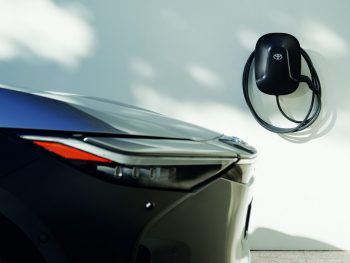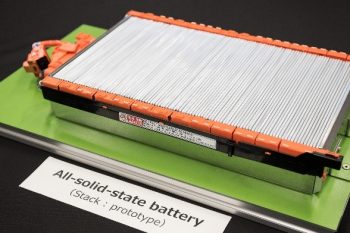Toyota’s future EVs to have 600+-mile range from 2026
Toyota Motor Corporation has unveiled new plans to “change the future of cars” through latest technology that will drastically increase the driving range of future electric vehicles and cut the cost and carbon footprint of their production.

Toyota’s technology plans centre on innovative battery EV technology and the establishment of a hydrogen business
Revealed at a technical briefing in Japan amid concerns that the carmaker is being left behind in the EV race, its multi-point plans include long-range battery electric vehicles (BEVs), all-solid-state batteries and full-scale commercialisation of hydrogen fuel cell electric vehicles (FCEVs). These will underscore its ongoing “multi-pathway approach” and support its transformation into a mobility company.
Its ‘next-generation battery EV strategy’ will evolve batteries with new technologies to offer different options to meet customer needs.
The first step will be to enhance developments in liquid lithium-ion batteries, which are currently the mainstream, improving the energy density of square batteries while also increasing the range through improved vehicle efficiencies, such as aerodynamics and weight reduction for performance versions.
Its forthcoming BEV, to be introduced in 2026, will have a cruising range of 1,000km (some 620 miles). At the same time, Toyota will work to reduce costs by 20% compared to the current bZ4X and achieve a quick charge time (10-80%) of 20 minutes or less.
Next up is work to develop low-cost batteries that will support the spread and expansion of BEVs in more popular price ranges. Bipolar structure batteries, already used in hybrids, will be applied to BEVs, using inexpensive lithium iron phosphate (LFP) as a material and expected to arrive around 2026/2027. This could give a 20% increase in range, a 40% reduction in cost and a quick recharge in about 30 minutes compared to the current bZ4X.
In parallel with this, Toyota is working on a high-performance battery that combines a bipolar structure with a high nickel cathode to bring further benefits. Due to debut in vehicles around 2027/2028, it will exceed the ‘performance version’ of the square battery, delivering a 10% increase in cruising range, a 10% reduction in cost, and a quick charge time of 20 minutes or less.

Toyota is also accelerating development of all-solid-state batteries
At the top end, Toyota is also accelerating development of all-solid-state batteries, seen as the holy grail for their ability to provide cost-effective, fast and safe charging technology.
While these haven’t been expected to arrive until the next decade, the Japanese giant says it’s currently developing a method for mass production, striving for commercialisation in 2027/2028.
Such technology could bring a 20% improvement in cruising range compared to the 1,000km performance version of the square battery due in 2026, potentially giving a range of some 1,200km (746 miles) while giving a quick charge time of 10 minutes or less.
A higher-level specification could advance this further, delivering a 50% improvement in the cruising range to 1,500km (932 miles).
In addition to battery innovation, Toyota will also work to extend EV range by minimising aerodynamic drag, improving BEV performance “beyond customer expectations”. The carmaker is studying the application of hypersonic technology used in rockets to BEVs and is collaborating with Mitsubishi Heavy Industries on a new technology that can reduce aerodynamic drag in any shape.
BEV technology and production processes will also evolve further to help cut production costs and enable mass-production.
Hand in hand with this, Toyota will continue its work on developing hydrogen fuel cell EVs, advancing its work with the Mirai for passenger cars, commercial trucks and buses, and establishing a new organisation, the Hydrogen Factory, in July this year.
It’s also developing next-generation fuel cells that it says will “deliver industry-leading performance for commercial use, with long life, low cost and low fuel consumption”. The plan is for these to be commercialised in 2026, giving consumers a choice of vehicles. Toyota is also exploring synthetic and bioethanol fuels, enabling it to “meet the requirements of diverse vehicle types, regions and customers”.













Tim Aylen13. Jun, 2023
I’ll believe Toyota’s claims when they are a reality. Their current EV isn’t great, with all that Hybrid history they should be the leader. Truth is they’re not and Tesla are leading the way!